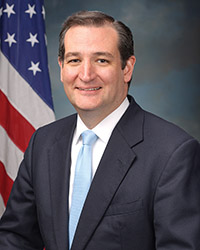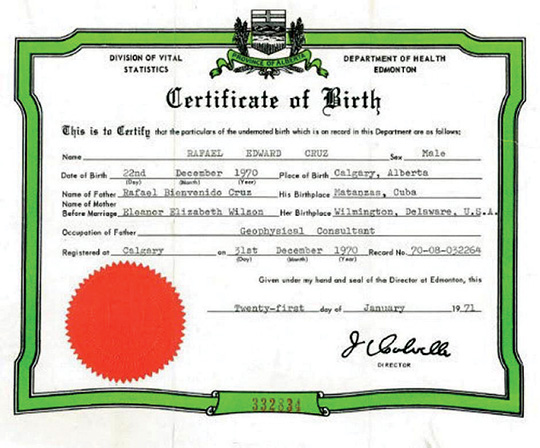BY LINDA BENTLEY | February 17, 2016
Alabama voters seek declaratory judgment regarding Cruz’s eligibility
Not every citizen is entitled to run for the Office of President of the United States; only ‘natural born’ citizens
 BIRMINGHAM, Ala. – Earlier this month, Attorney Thomas E. Drake, II, on behalf of five registered Alabama electors: Sebatian Green, Shannon Duncan, Katheryne Spears, Kyle Spears and Jerry Parker, filed a declaratory judgment action in U.S. District Court for the Northern District of Alabama against Rafael Edward “Ted” Cruz, seeking judgment of the court declaring Cruz “ineligible to qualify/run/seek and be elected to the Office of President of the United States of America.”
BIRMINGHAM, Ala. – Earlier this month, Attorney Thomas E. Drake, II, on behalf of five registered Alabama electors: Sebatian Green, Shannon Duncan, Katheryne Spears, Kyle Spears and Jerry Parker, filed a declaratory judgment action in U.S. District Court for the Northern District of Alabama against Rafael Edward “Ted” Cruz, seeking judgment of the court declaring Cruz “ineligible to qualify/run/seek and be elected to the Office of President of the United States of America.”
Because Cruz was born on Dec. 22, 1970 in Calgary, Alberta, Canada, the complaint asserts Cruz is not a “natural born” citizen of the United States and alleges he is a natural born citizen of Canada and should be disqualified from seeking the office of President of the United States.
Plaintiffs allege Cruz cannot be a natural born citizen of two countries, stating, “This would violate elementary rules of logic.”

At the time of Cruz’s birth in Calgary, the complaint alleges he became a Canadian citizen and claims “the United States could not confer citizenship upon him under any law or legal theory that exists.
It goes on to state, “’Natural born’ means native born within the United States or its dominions/territories. Canada is not a territory of the United States.”
Plaintiffs claim it is irrelevant whether Cruz’s mother was/is a U.S. citizen and only if she were serving as an ambassador to a foreign country, or stationed in another country while serving in the military, would it not bar Cruz’s candidacy.
While plaintiffs concede Cruz is a valid citizen of the United States, they adamantly argue he is not a natural born citizen and, more specifically, his citizenship was conferred by other means.
Article 2, Section 1, Clause 5 of the U.S. Constitution states: “No Person except a natural born Citizen, or a Citizen of the United States, at the time of the Adoption of this Constitution, shall be eligible to the Office of President; neither shall any Person be eligible to that Office who shall not have attained to the Age of thirty-five Years, and been fourteen Years a Resident within the United States.”
Emerich de Vattel’s 1758 “Law of Nations,” which the framers appear to have relied upon, describes in book one, chapter 19 § 212. Of the citizens and natives: “The citizens are the members of the civil society; bound to this society by certain duties, and subject to its authority, they equally participate in its advantages. The natives, or natural-born citizens, are those born in the country, of parents who are citizens. As the society cannot exist and perpetuate itself otherwise than by the children of the citizens, those children naturally follow the condition of their fathers, and succeed to all their rights. The society is supposed to desire this, in consequence of what it owes to its own preservation; and it is presumed, as matter of course, that each citizen, on entering into society, reserves to his children the right of becoming members of it. The country of the fathers is therefore that of the children; and these become true citizens merely by their tacit consent. We shall soon see whether, on their coming to the years of discretion, they may renounce their right, and what they owe to the society in which they were born.
I say, that, in order to be of the country, it is necessary that a person be born of a father who is a citizen; for, if he is born there of a foreigner, it will be only the place of his birth, and not his country.”
The framers of the Constitution included the clause, “or a Citizen of the United States, at the time of the Adoption of this Constitution” so as not to exclude themselves from becoming president, since they were all born abroad.
While no term limits were set, President George Washington established a tradition by retiring after two terms in office – a tradition that wasn’t broken until 1940 when Franklin Delano Roosevelt was elected to a third term and likely the event that prompted the 22nd Amendment to the U.S. Constitution, which states:
“No person shall be elected to the office of the President more than twice, and no person who has held the office of President, or acted as President, for more than two years of a term to which some other person was elected President shall be elected to the office of the President more than once. But this article shall not apply to any person holding the office of President when this article was proposed by the Congress, and shall not prevent any person who may be holding the office of President, or acting as President, during the term within which this article becomes operative from holding the office of President or acting as President during the remainder of such term.”
Section 2 of the 22nd Amendment required, in order for it to become operative, ratification by three-fourths of the states within seven years from the date of its submission to the states by Congress.
The amendment was passed by Congress on March 21, 1947 and was ratified by the requisite 36 of the then-48 states on February 27, 1951.
There were others who sought a third term prior to Roosevelt. However, none won their party’s nomination.
Plaintiffs allege “Not every citizen is entitled to run for the Office of President of the United States; only ‘natural born’ citizens,” claiming they have a legally protected right to vote for lawfully qualified candidates and unqualified or ineligible candidates must be removed so as not to siphon off votes from those lawfully on the ballot.


